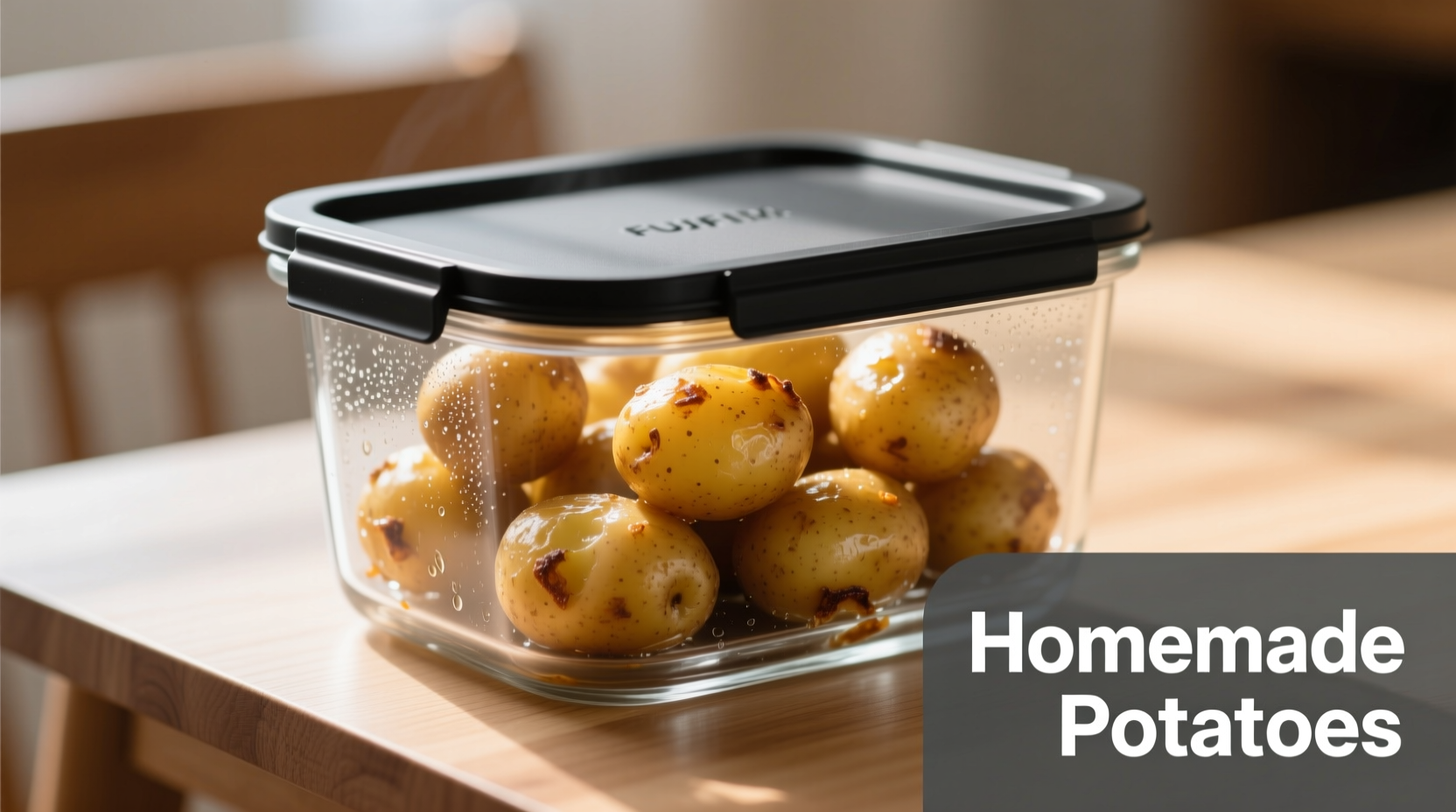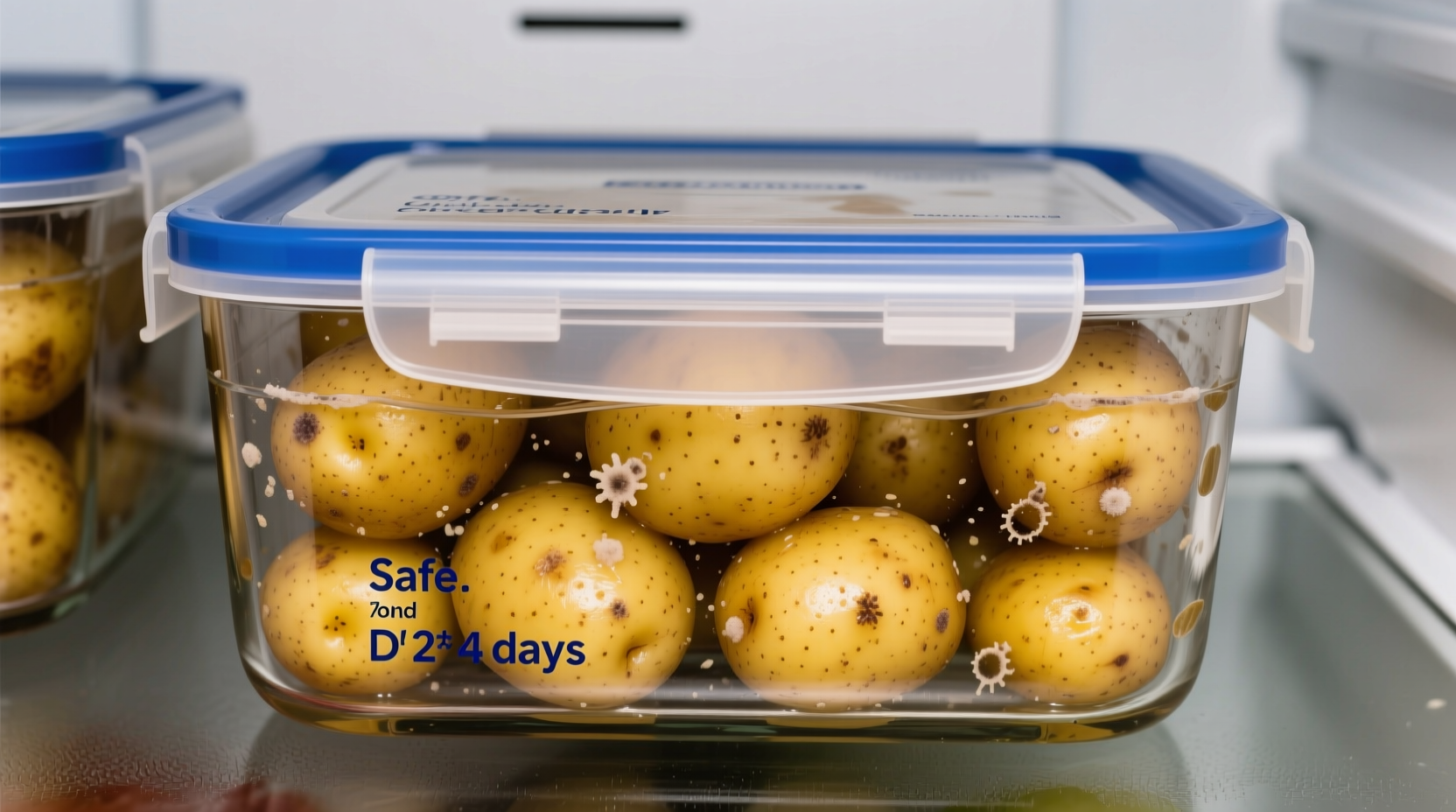Discover exactly how long your cooked potatoes stay fresh and safe to eat—plus practical storage techniques that maximize freshness while preventing foodborne illness. Whether you've prepared a large batch for meal prep or have leftovers from dinner, understanding proper potato storage could save you from food waste and potential health risks.
Why Proper Potato Storage Matters
Potatoes might seem simple, but improper storage creates perfect conditions for bacteria growth. The USDA identifies cooked vegetables like potatoes as potentially hazardous foods because they provide moisture, nutrients, and near-neutral pH—ideal for pathogens like Clostridium perfringens and Staphylococcus aureus. Following science-backed storage guidelines protects your health while preserving flavor and texture.
Immediate Post-Cooking Handling: The Critical First Steps
The clock starts ticking the moment potatoes finish cooking. Here's what to do within the first two hours:
- Cool rapidly: Spread potatoes in a single layer on a clean baking sheet rather than leaving them in a hot pot
- Avoid temperature danger zone: Never leave cooked potatoes between 40°F-140°F (4°C-60°C) for more than 2 hours (1 hour if room temperature exceeds 90°F/32°C)
- Portion control: Divide large batches into smaller containers to cool faster
According to the FDA Food Code, rapid cooling prevents bacterial multiplication. Potatoes left at room temperature for 4 hours could contain enough bacteria to cause illness—even after reheating.
Refrigerator Storage Guidelines by Preparation Type
Storage duration varies based on how potatoes were prepared. Always use airtight containers to prevent moisture loss and odor absorption.
| Preparation Method | Refrigerator Shelf Life | Storage Tips |
|---|---|---|
| Boiled or steamed (whole) | 4-5 days | Store in original skin to retain moisture |
| Mashed potatoes | 3-4 days | Press plastic wrap directly on surface to prevent skin formation |
| Roasted or baked | 4 days | Cool completely before storing to prevent condensation |
| Potato salad | 3-4 days | Keep dressing ingredients in mind—mayonnaise-based versions spoil faster |
This data aligns with USDA Food Safety and Inspection Service recommendations. The slightly shorter timeframe for mashed potatoes reflects their increased surface area and moisture content, which accelerates bacterial growth.
Freezing Cooked Potatoes: When It Works
Freezing extends shelf life but works better for some preparations than others:
- Best for freezing: Roasted wedges, boiled chunks, mashed potatoes (add extra fat like butter before freezing)
- Poor candidates: Baked potatoes (become watery when thawed), potato salads with mayo
- Proper technique: Cool completely, portion into freezer bags with air removed, freeze flat for quick thawing
- Storage duration: 10-12 months at 0°F (-18°C)
University of Minnesota Extension research shows properly frozen potatoes maintain quality for up to a year, though flavor and texture gradually decline after 6 months. Always thaw frozen potatoes in the refrigerator—not at room temperature—to maintain safety.
Identifying Spoiled Cooked Potatoes
Don't rely solely on expiration dates—check for these spoilage indicators:
- Visual changes: Green spots (solanine development), mold growth, or darkening
- Texture issues: Slimy surface, excessive mushiness, or dry, hardened edges
- Smell test: Sour, fermented, or unpleasant odors (fresh potatoes should have earthy, neutral scent)
- Taste warning: Bitter flavor indicates solanine formation—spit out immediately
The CDC reports that solanine poisoning from spoiled potatoes causes gastrointestinal symptoms in approximately 20% of cases. When in doubt, throw it out—no amount of reheating destroys these toxins.

Safe Reheating Practices
Proper reheating destroys surviving bacteria but requires precise temperature control:
- Minimum internal temperature: 165°F (74°C) as measured by food thermometer
- Stovetop method: Add small amount of liquid to prevent drying, heat gently while stirring
- Microwave technique: Cover with damp paper towel, stir midway through heating
- Avoid multiple reheating cycles: Portion leftovers to reheat only what you'll eat immediately
Research from the Journal of Food Protection shows that uneven reheating leaves cold spots where bacteria survive. Stirring during reheating ensures even temperature distribution.
Special Considerations for Food Safety
Certain situations require modified storage approaches:
- Potatoes with dairy: Mashed potatoes with milk/butter have same shelf life as plain versions, but dairy-based dishes like scalloped potatoes last only 3-4 days
- Outdoor events: Never leave cooked potatoes unrefrigerated for more than 1 hour when ambient temperature exceeds 90°F (32°C)
- Travel considerations: Use insulated containers with ice packs to maintain safe temperatures during transport
These context boundaries reflect FDA guidelines for potentially hazardous foods at temporary events. The shortened timeframe during hot weather accounts for accelerated bacterial growth in warmer conditions.
Maximizing Freshness: Pro Tips from Food Science
Extend your cooked potatoes' shelf life with these evidence-based techniques:
- Add lemon juice or vinegar (1 tablespoon per pound) to boiled potatoes before storing to lower pH
- Store potatoes away from strong-smelling foods like onions which can affect flavor
- Use glass containers instead of plastic to prevent odor absorption
- Label containers with preparation date using masking tape
These methods leverage food preservation principles documented by the National Center for Home Food Preservation. The acidification technique creates a less hospitable environment for bacterial growth while maintaining safety.
Frequently Asked Questions
Can I eat cooked potatoes after 7 days in the refrigerator?
No, cooked potatoes should not be consumed after 5 days in the refrigerator. The USDA recommends discarding cooked vegetables after 3-5 days due to potential bacterial growth that can cause foodborne illness, even if they appear normal.
Do cooked potatoes last longer in the fridge if left in their skin?
Yes, keeping cooked potatoes in their skin extends freshness by 1-2 days compared to peeled versions. The skin acts as a natural barrier against moisture loss and contamination. Whole baked or boiled potatoes with skin intact typically remain safe for 4-5 days versus 3-4 days for peeled preparations.
Why do mashed potatoes spoil faster than roasted potatoes?
Mashed potatoes spoil faster due to increased surface area exposed to air and higher moisture content. The breakdown of cell structure during mashing creates more entry points for bacteria. Additionally, the incorporation of dairy products in many mashed potato recipes provides additional nutrients for microbial growth.
What's the best container for storing cooked potatoes?
Airtight glass containers are ideal for storing cooked potatoes. They prevent moisture loss, block odor absorption, and don't retain stains or smells like plastic containers. For mashed potatoes specifically, press plastic wrap directly onto the surface before sealing the container to prevent skin formation and oxidation.
Can you get food poisoning from improperly stored cooked potatoes?
Yes, improperly stored cooked potatoes can cause food poisoning from bacteria like Clostridium perfringens and Staphylococcus aureus. These pathogens thrive in the temperature danger zone (40°F-140°F) and can multiply to dangerous levels within hours. Symptoms typically include nausea, vomiting, and abdominal cramps appearing 6-24 hours after consumption.











 浙公网安备
33010002000092号
浙公网安备
33010002000092号 浙B2-20120091-4
浙B2-20120091-4